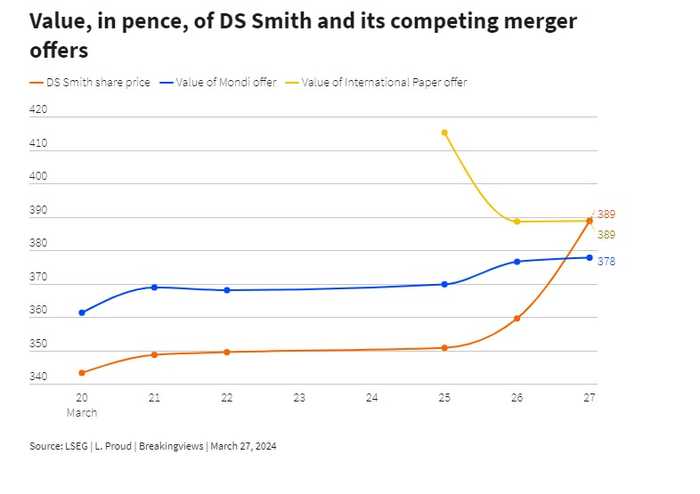Published 22:30 IST, March 27th 2024
Packaging deal’s US interloper may end up as pulp
UK-based Mondi and its compatriot DS Smith hashed out the broad terms of an all-share takeover.
- Republic Business
- 3 min read

Paper chase. International Paper appears to have boxed itself in. On Tuesday, the $13 billion U.S. pulp-to-packaging group said it had proposed an all-share offer to buy London-listed DS Smith, which had already agreed in principle to merge with UK peer Mondi. The interloper’s initial terms were more generous on paper, but its $7.2 billion equity offer quickly crumpled, leaving outgoing boss Mark Sutton in a bind.
The most recent dealmaking wave in the sector kicked off in September last year, when Ireland-based Smurfit Kappa swooped on U.S. rival WestRock to create a global leader in packaging material. In early March, UK-based Mondi and its compatriot DS Smith hashed out the broad terms of an all-share takeover, valuing the target at just over $6.5 billion.
Enter International Paper, whose chair and outgoing CEO Sutton probably thought he had shredded the Mondi deal by offering a higher premium to DS Smith investors. A 6% selloff in his company’s stock on Tuesday quickly turned the page. Based on the latest share prices and currency levels, International Paper’s proposal is worth barely more than Mondi’s existing one. Given that the U.S. group has several disadvantages, Sutton needs to come up with a much more alluring package.
His problem is that DS Smith shareholders have good reasons to stick with Mondi. Bundled together, the two UK-based businesses would be a European giant. Their overlap would allow chunky costs savings of anywhere between $300 million and $500 million annually, based on analysts’ estimates. Using the midpoint of that range, and after applying a 25% tax rate, the present value of those cuts could be worth over $3 billion. DS Smith shareholders would stand to get almost half of that value by virtue of their 46% holding in the combined group.
The so-called cost synergies for International Paper, however, are probably smaller. It only generates 8% of revenue from Europe. It follows that the combination would probably create less value than the alternative, meaning Sutton has fewer goodies to promise DS Smith shareholders. His company’s U.S. listing may also be a problem for any UK-based fund managers holding DS Smith stock, whose mandates might only include their home market.
One option is for International Paper to walk away, though that would potentially leave it stranded while the rest of the sector bulks up. The other option is to repackage the deal, and potentially include some cash. The U.S. group’s net debt will end 2024 at just under 2 times its projected EBITDA for the year, using LSEG data. If Sutton and his incoming CEO Andrew Silvernail are happy to raise leverage to around 3 times EBITDA, they could potentially stump up over $2 billion of cash to incorporate into an offer. That might antagonise International Paper’s investors even further. But the alternative is to fold like a flimsy cardboard box.

Updated 22:30 IST, March 27th 2024